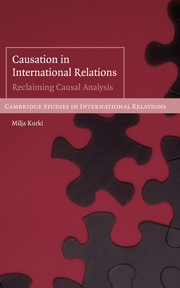Book contents
- Frontmatter
- Contents
- List of figures
- Acknowledgements
- Introduction: the problem of causation and the divided discipline of International Relations
- Part I The Humean philosophy of causation and its legacies
- Part II Rethinking the concept of cause
- 5 Attempts to move beyond Humeanism: strengths and weaknesses
- 6 Rethinking causation: towards a deeper and broader concept of cause
- Part III Reconfiguring causal analysis of world politics
- References
- Index
- CAMBRIDGE STUDIES IN INTERNATIONAL RELATIONS
5 - Attempts to move beyond Humeanism: strengths and weaknesses
Published online by Cambridge University Press: 22 September 2009
- Frontmatter
- Contents
- List of figures
- Acknowledgements
- Introduction: the problem of causation and the divided discipline of International Relations
- Part I The Humean philosophy of causation and its legacies
- Part II Rethinking the concept of cause
- 5 Attempts to move beyond Humeanism: strengths and weaknesses
- 6 Rethinking causation: towards a deeper and broader concept of cause
- Part III Reconfiguring causal analysis of world politics
- References
- Index
- CAMBRIDGE STUDIES IN INTERNATIONAL RELATIONS
Summary
Part I of this book has argued that so-called Humean assumptions, which reduce causal analysis to regularity analysis of observables and entail the assumptions of regularity-determinism (given regularities, we can make ‘when A, then B’ statements about causal relations and have a basis for prediction) and efficient causality (given regularities, causes should be thought of as ‘pushing and pulling forces’), have been overwhelmingly dominant in twentieth-century philosophy of science and philosophy of social science. It has been seen that contemporary IR theorising has also been deeply informed by these assumptions, which has given rise to particular kinds of understandings of the nature of causes and of causal analysis in the recent disciplinary debates. We have seen that rationalists, in their efforts to conform to prescriptions of the Humean conception of causal analysis, have conducted causal research that has tendencies towards ‘additive’ and regularity-deterministic analysis and that has found it difficult to engage with unobservable aspects of the social world, notably with processes of ‘social construction’. On the other hand, the reflectivists who have analysed these aspects of the social world have tended to reject causal analysis, with the hope of thereby avoiding the deterministic connotations of the Humean approaches. Constructivists have often retained some reference to causation but have in most cases been unable to think outside the Humean box when it comes to causal assumptions.
- Type
- Chapter
- Information
- Causation in International RelationsReclaiming Causal Analysis, pp. 147 - 188Publisher: Cambridge University PressPrint publication year: 2008



